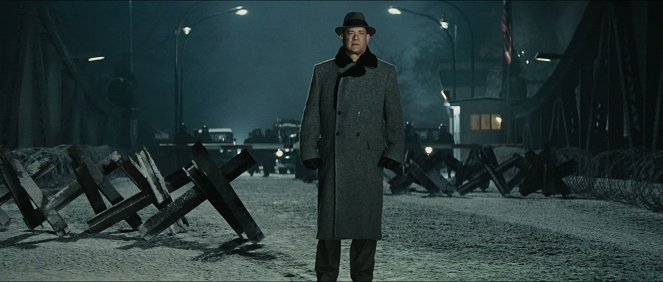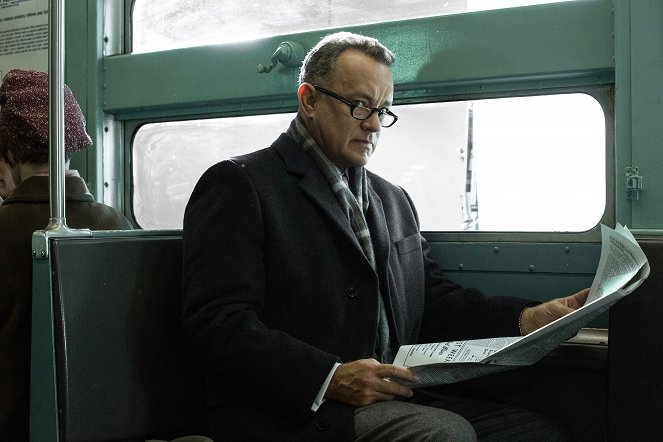Director:
Steven SpielbergCámara:
Janusz KaminskiMúsica:
Thomas NewmanReparto:
Mark Rylance, Domenick Lombardozzi, Victor Verhaeghe, Brian Hutchison, Tom Hanks, Joshua Harto, Henny Russell, Alan Alda, John Rue, Billy Magnussen, Amy Ryan (más)Streaming (3)
Sinopsis(1)
Década de los años 60. Estados Unidos y la Unión Soviética se encuentran en plena Guerra Fría. El 1 de mayo de 1960 un avión espía estadounidense es derribado por el ejército enemigo cuando sobrevolaba territorio soviético. Sorprendentemente, el piloto Francis Gary Powers logra escapar gracias a su paracaídas. Cuando ya se creía a salvo, el piloto del avión U-2 es capturado por los soviéticos. Tras este suceso, el abogado especializado en seguros James B. Donovan (Tom Hanks) es reclutado por la CIA como encargado de negociar la liberación del soldado. Ante este encargo casi imposible de negociar, el abogado de Brooklyn se ve súbitamente inmerso en las entrañas de la Guerra Fría, ya que su misión supone llevar a cabo intensas negociaciones, para canjear al piloto estadounidense capturado y poder así liberarlo. La pieza clave del acuerdo con los soviéticos será Rudolf Abel, espía del Kremlin atrapado por el FBI en la Brooklyn de 1957. Con el único objetivo de hacer lo que es justo y correcto, este hombre ordinario y padre de familia tendrá que enfrentarse a situaciones extraordinarias, y arriesgarlo todo en defensa de valores como la integridad, el idealismo y la honradez. (20th Century Fox España)
(más)Videos (14)
Reseñas (14)
První část vynikající, atmosfericky silná, skvělý výkon Marka Rylance, pak se z toho už stal typický, klišovitý a místy trapný americký film se vším, co si pod pojmem americký film dokáže člověk představit. Nevadí mi, když se film v dusné atmosféře odlehčí vtipem, ale zdá se mi, že některé hlášky nebo vtípky umělecké vyznění spíše devalvovaly a nehodily se. Špionážní thriller z východního Berlína a odlehčený humor, to je spojení na oxymóron. V takových situacích měli všichni sevřený zadek a neměli myšlenky na vtipkování. Tom Hanks podal standardní výkon, potěšila mě malá role Sebastiana Kocha, asi si ho po Das Leben der Anderen všimnuli všude ve světě.
()
Ciertamente un poco embellecido y no lo suficientemente emocionante, pero aún así es un suspenso de espías entretenido con una maravillosa imagen retro. Me gustaron mucho los movimientos de cámara, enfocando a tres personas en la mesa, tal y como se rodaba hace 50 años. Gran ambientación atmosférica para la época, diálogos elegantemente escritos, Hanks, un buen papel a través de Mark Rylance. La política mundial debería ser dirigida por gente como Spielberg. Y no por otros.
()
Bridge of Spies is a film about America, friendship despite the times and men who are just doing their jobs. Several decades ago, Hanks’s unassuming protagonist would probably have been played by Gary Cooper or James Stewart in a film directed by Frank Capra. As in Capra’s works, in Bridge of Spies American values are represented and defended by incorruptible individuals, not by unreliable institutions. At the same time, the quest for justice leads through so many obstacles and compromises that, at the end, instead of the joy of victory, there is a sense of relief that it’s over. (In addition to that, Spielberg again shows himself to be a master of suggestion and narrative shorthand in the climax, as he makes do with a very simple yet very telling shot of children climbing over a fence. In the context of the previously seen scaling of the Berlin Wall, unsettling cracks thus appear in the façade of the happy ending). ___ Donovan demonstrates his position outside of the system in both halves of the film by following his own rules of the game. He doesn’t act in the way that the people who have given hin his orders think he should act. His concept of justice is not subject to the anti-communist panic, and he makes fun of espionage work (“You know, spy stuff”), not giving it the degree of importance that you would expect from the protagonist of a spy thriller (interrupting a dialogue about the next course of action by telephoning his wife, with whom he sorts out what kind of jam he should bring her from the “fishing trip”). I see as the main screenwriting contribution of the Coen brothers, who, despite all their respect for classic Hollywood, never quite took it entirely seriously (just wait until the premiere of Ave, Caesar! for more compelling evidence) in their subversion of the exaggerated seriousness of a courtroom drama or spy movie by intentionally or seemingly leaving out genre-typical characters and employing down-to-earth catchphrases (“Can we just call them the Russians and save time?”), whose timing demonstrates the intuition of the master. ___ As is customary with Spielberg, the protagonist will have to defend his actions not only to the general public, but also (and, in the end, especially) to his family. Though absent from the latter part of the film, Donovan’s family is both an important motivation of Donovan’s actions (his repeatedly expressed wish to return to the warmth and comfort of his home, which he at least recalls with a hearty breakfast at the Hilton in Berlin) and the source of his doubts as to whether he is a good father to his son and a good husband to his wife. ___ The film’s opening scene, in which we see three different versions of Vogel (live, reflected in a mirror and in a finished self-portrait), aptly introduces us to the world of spies alternating between multiple identities while creating false expectations about the perceptibility of Vogel’s intentions. It soon becomes clear that he is not only a man who maintains an icy calm in all circumstances, but also one of the narrative’s most direct and honourable characters. He even wins over Hanks’s attorney with his sincerity. The special affinity between the two men, who need and influence each other, is expressed in the Berlin part of the film through Hanks’s cold, which forces him to constantly wipe his nose, just as we previously saw the phenomenal Mark Rylance do. ___ The creation of parallels between the individual characters and storylines is one of the film’s strengths, contributing along with the spiral structure of the narrative to its cohesiveness and subverting the black-and-white view of history. The second half of the film (which actually begins exactly halfway through the runtime) is basically a variation on the first half, thanks to which we realise that the two parties to the conflict have more in common than they are willing to admit. The individual shots often respond to each other and, thanks to their smooth continuity, we don’t fall out of rhythm and our attention doesn’t waver. ___ I find it almost needless to praise in Bridge of Spies the elements with which most of Spielberg’s films excel – economical and comprehensible storytelling through imagery and careful management of the viewer’s attention (largely without manipulating emotions – the film is unusually sparing in its use of music, using it for the first time after almost half an hour). Spielberg prepares us in advance with a musical motif, among other things, for the espionage plot, which does not fully take off until the second half of the narrative (the absence of exposition causes the storyline with the suddenly appearing economics student to seem clumsy) and alerts us to what we should pay attention to (“...whether they will embrace me or just put me in the back seat”). He expresses the dominance of one character or the other by their position in the shot, illustrates the thought process or the rebuttal of an argument with a counter-argument through appropriate camera movement, and completes the atmosphere with different colourways for the (warmer) West and the (almost colourless) East. Though 90% of Bridge of Spies consists of scenes in which two old men sit at a table and converse at length, it is every bit as gripping and suspenseful from start to finish as films based on ceaseless action (such as Mad Max). 85%
()
(menos)
(más)
I must admit that I was a little sceptic about this movie. Personally, I don’t find the topic of espionage in the 1950s particularly suspenseful, but I was keeping in mind that Spielberg and Hanks were responsible for this and I shouldn’t have doubted them in the first place. I couldn’t have been happier after watching this and I must add that it’s one of the best movies that made it to Oscars this year. The story is absolutely natural and it’s really befitting the Cold War. Tom Hanks is a classic, but everybody is outshined by Mark Rylance whom I didn’t even known before, but now I know that I won’t forget about him. The only issue was the music, which was too American and it could do without all those emotions. The ending is a little too exaggerated, which doesn’t have to suit anyone. I was pissed, but it still didn’t make me take away a star; I’ve enjoyed this movie way too much for that over these two hours and a half.
()
Lemonade Steven, or craft certainty. Yet even that can't deny the fact that Spielberg is stealing from himself, and as much as he wants to talk about strong ideas, he still comes out with kitsch that transgresses his "self-genre" boundaries. It's a great watch, and likely a few conservatives who will seem to step out of their conformist zone will give it a few awards, but the next day all I remember is the sheer coldness. What literally sticks out in some of the dialogue is the fact that the Coen brothers would have loved to have made it with a much greater degree of cynicism.
()



Anuncio